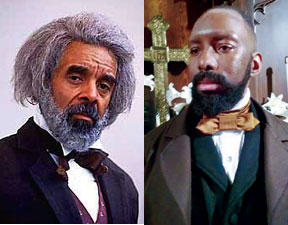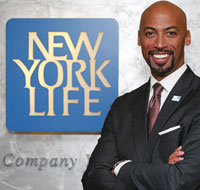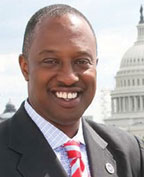
 Black edutainers bring history to life
Black edutainers bring history to life
Fred Morsell as Frederick Douglass. (Courtesy of Morsell)
Watts as Jacob White Jr. (Courtesy of Watts)
By K. Barrett Bilali, Urban News Service
Philadelphia resident Antoine Randolph Watts likes to dress up. But most of his outfits are out of date. Like 200 years out of date.
And he often changes his voice, accent and beard length with each outfit.
“No, I don’t have a personality disorder,” says Watts. “I’m what’s called a first-person impressionist.” He is also part of a growing industry called edutainment.
Watts is one of thousands of Americans who transform themselves into real-life historic personalities from this country’s collective past. Their period costumes are accurate. They change their walk, their speech and learn every aspect of people’s lives and times in minute detail — so much so that their audiences may feel as if they have transited a time tunnel. It is live history, up close and personal.
Like those from other back-grounds, Black edutainers share a common ability to portray characters, an abiding love of teaching and, some-where along the way, they all were bitten by the history bug.
Watts says he was bitten quite young.
“I was six years old, watching a John Wayne movie called The Horse Soldiers,” says Watts, 42, telling the story as if it happened yesterday. “John Wayne took his patrol behind Con-federate enemy lines to a final stand at Newton Station.”
Watts is clean-shaven and speaks with a French accent when he dons a Revolutionary-era suit and depicts Joseph Bologne, le Chevalier de Saint-George (1745-1799). Bologne was a French-African composer, violin virtuoso, swordsman and colonel during the French Revolution.
When he portrays James Forten, Watts wears mutton chops. Forten (1766-1842) was an American Revolutionary naval veteran, sail maker, abolitionist, writer and owner of a Philadelphia sail loft.
But Watts’s favorite and best-known character is Jacob Clement White Jr. (1836-1902), a role that requires a full beard. White was the first graduate of the Institute for Colored Youth, which grew into Cheney University. White became Philadelphia’s first African American school principal in 1866.
“It takes me three or four months to grow my beard to portray Prof. White,” says Watts, who acknowledged that he prepares months in advance for all of his roles. He studies the lives of all of his characters in great detail.
“We are a part of the Black edutainment industry,” says Ludger Balan, president of Che Nautical Edutainment. Balan is also the communications director for the United States Colored Troops Living History Association.
Balan helps coordinate Black edutainment programs and historic war reenactments across America from his office in Queens, N.Y.
“This industry includes historical interpreters, impressionists, reenactors, storytellers and any highly educational event which is a performance,” says Balan.
These dedicated and often part-time performers work in schools, colleges and other venues. Most edutainment organizations are non-profits. However, they earn revenues that go back into higher-quality productions, authentic materials for props and constant research and writing, Balan says.
“One of our greatest challenges is finding enough interest in our schools,” says Balan. “America just doesn’t celebrate its history anymore.”
Sharon Banks discovered the effectiveness of Black edutainment. The head librarian at the Queens Library in Cambria Heights, N.Y., contracted Balan’s organization to stage a Black History Month appearance in February. “He made what could be dry, dusty history pages come alive,” says Banks.





Be the first to comment